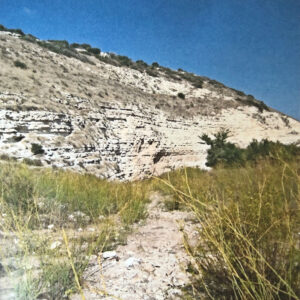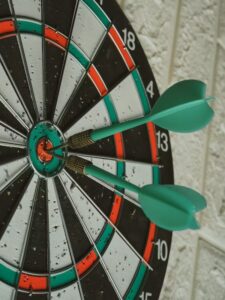
“Skill and confidence are an unconquered army.” –George Herbert
* * *
My husband and I hired a private guide to take us on a one-day tour since we were pressed for time. When our guide stopped her car by the side of the road next to a desolate field between two hills, we thought she must have made a mistake. There were no tour busses and no other people around. The three of us got out, walked into the valley, and stopped by a dry creek bed filled with smooth stones.
It was hard to believe the undistinguished field in which we were standing was the location of one of the most famous battles in the history of the world. This was the Valley of Elah, the site where David fought Goliath.
We’re all familiar with the story. Goliath wasn’t just some big guy. He was a giant who taunted his enemies and called them cowards. They were understandably terrified of him. All except David, the young shepherd boy who had no experience in warfare but convinced King Saul that he (David) could defeat the Philistine giant with only his sling.
“Then he took his staff in his hand, chose five smooth stones from the stream, put them in the pouch of his shepherd’s bag and, with his sling in his hand, approached the Philistine.” 1 Samuel 17:40
I’m not sure I appreciated the magnitude of David’s accomplishment until I picked up a stone from that same creek bed and realized how small it was. And yet one of those stones, slung more than three thousand years ago, saved the young nation of Israel and changed the world.
* * *
Many parents share the story of David and Goliath with their children to instill courage and faith in their offspring. They want them to know they will face giants in their lives, but they can overcome. However, one thing we don’t often talk about when we relate the story is the skill young David had with a sling.
David was a shepherd, certainly a lonely occupation. He must have spent many months alone, looking after his father’s flocks and protecting them from wild animals. David even explained this to King Saul who had doubted his abilities:
“Your servant used to keep sheep for his father. And when there came a lion, or a bear, and took a lamb from the flock, I went after him and struck him and delivered it out of his mouth.” ! Samuel 17:34-35
I’m guessing David got very good with his sling during those months and years. Besides fighting wild animals, I can envision him setting a tin cup on a tree branch and practicing his slinging expertise day after day.
In contrast to the slow-moving, armor-burdened Goliath, David was quick and agile. His stone wouldn’t be effective against Goliath’s armor, but he had a target that would bring down his opponent: Goliath’s unprotected forehead. It only took one shot, and the giant was dead.
* * *
Developing skill is obviously important in any field. I recently read an article on this subject on the Personal Excellence website. A couple of sentences stood out to me.
“… people are often impressed by what others have accomplished without realizing what they went through to get there. We see their accolades and victories, and make gross assumptions about what it takes to succeed.”
I think this is especially true of writers. We all know how to string words together to make sentences, and we’ve read lots of good books. How hard can it be to write one of our own? But TKZ regulars know it is oh, so much more than that.
I was looking for some straightforward guidance about the development of skills when I stumbled on the site of the Morningside Graduate School of Biomedical Sciences that enumerated the necessary ingredients. Here are the basics they listed:
- Get training.
- Practice.
- Get feedback.
That looks pretty simple, but we know each one of those items is a world of its own.

So, TKZers: Do any of your books have a David vs. Goliath theme? How did your hero defeat the giant? (Or did he?)
How do you train for your writing?
How much time to you spend practicing? What kind of practice do you recommend?
How do you get feedback?
